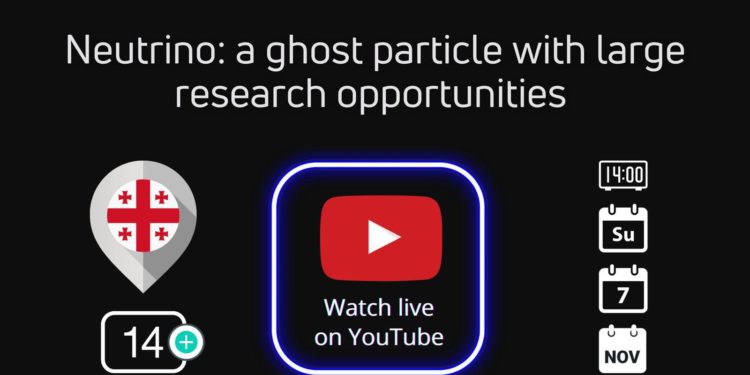Georgia is involved in a multinational project that may reveal and change many things in terms of physics.
On Sunday, group of physicists, with guidance from Tbilisi State University Professor Revaz Shanidze, gave a lecture on the topic of Neutrino – a very special particle with questions yet unanswered. While in France and Italy, scientists are concentrated more on the observation of the hardware part of it, the Georgian team is collecting and analyzing data about the software.
The lecture, hosted by Terminal, a co-working and conference space in Tbilisi, was particularly well organized. The high-class presentation with live-stream on Youtube was made possible by Ioli.Digital, Relocater and its CEO Stanislav Sabanov.
Importantly, D-Tech, the partner company of Sabanov, awarded a grant to a group member and master student of Professor Shanidze – David Janezashvili, in order to make the process of research more successful and fruitful.
The event was held in collaboration with the Teenage Intellectual Club Tbilisi.
The conference was aimed at sharing knowledge and finding new interested people who might become researchers. The presentation was attended by many local and foreign students interested in this field, meaning the conference itself contributed to finding more young researchers. Professor Shanidze and his students, thanks to their brilliant knowledge of the field, made the topic clear and well-understandable for attendees.
GEORGIA TODAY asked students of Professor Shanidze for more details on these interesting findings.
“Far from the deep ocean, Neutrino is important for astrophysical research,” Gogita Papashvili, Student & Researcher, told us. “There are many types of phenomenal processes that are yet unanswered. For example, where do ultra high energy cosmic rays come from, and Neutrino is exactly what we need to find the answer. Many scientists might become interested in this project, maybe young students like me as well. I would like to see more people involved because nowadays Neutrino physics is one of the most interesting and active part of Physics itself.”
How the universe was created, how it evolved and functions these days, these are the questions which have to be answered, and research on neutrino is a crucial part of this process.
“KM3NeT – The Cubic Kilometer Neutrino Telescope, located at the bottom of Mediterranean Sea, is designed to study this fundamental particle. It is a collaboration of 15 countries and our group, on behalf of Georgia, is in it,” says Giorgi Qistauri, Student & Researcher. “Our team is involved in the analysis of experimental data, using a local server at the High Energy Physics Institute of Tbilisi State University. Results are shared with collaboration working groups at workshops and conferences in different countries, either virtually or physically. Perceiving Neutrino is crucial to finalizing our understanding of the origins of the universe, so if the consequences of this study give us the ultimate result, maybe a Nobel Prize will be well-deserved for the discovery.”
Revaz Shanidze, Associated Professor at the Tbilisi State University: “I’m a member of an international research collaboration called KM3NeT, working on Neutrino physics and astrophysics. This is a big European project. It started about 20 years ago, a time when I was working in Germany, and I was involved in this experiment and project from there. Then I came back to Georgia, it was about 5-6 years ago, and my colleagues asked me if I wanted to participate in this project in Georgia. As it was very exciting to me, I decided to join.
“Their collaboration with the Tbilisi State University started 4 years ago, and it successfully continues. We are full members of this collaboration. I’m involved in this experiment along with a relatively small group of students. We have two PHD and one Masters students in the group. We’re developing software for data analysis, so, we’re mainly busy with computer development and data analysis. For this, we’ve organized a computer station at the TSU, as computing is a big part of this experiment. The data we collect and analyze there is then discussed and analyzed by other university groups. Our group is very glad to be able to participate in this big and important European project. Our young students are doing a very good job. We’re studying Neutrino particles with our detectors. Also, we’re studying astrophysics with Neutrinos. Understanding the physical processes that are developing there can also be beneficial for energy production in the country. As a result, we’ll get knowledge about Neutrinos, as we don’t yet know many things about it. It’s very difficult to do experiments with them, so we’re trying to understand questions related to Neutrino physics and, after this experiment, we expect to have much more understanding of this fundamental particle.”
This conference was neither the first nor the last, meaning this group of great Georgian physicists will continue to inform people on new discoveries in the future. In turn, D-tech expresses readiness to continue to support young and motivated researchers for the further development of science.
https://www.youtube.com/watch?v=prCKxZdGpHg&feature=youtu.be&fbclid=IwAR3iWy74X1nGkqTCuvRMZDwCLKYskiaSeAeGLOqm1TGTEBoBHyHWduBi35Y&ab_channel=%E1%83%A8%E1%83%95%E1%83%94%E1%83%A3%E1%83%9A%E1%83%98%E2%80%A2Shveuli


















